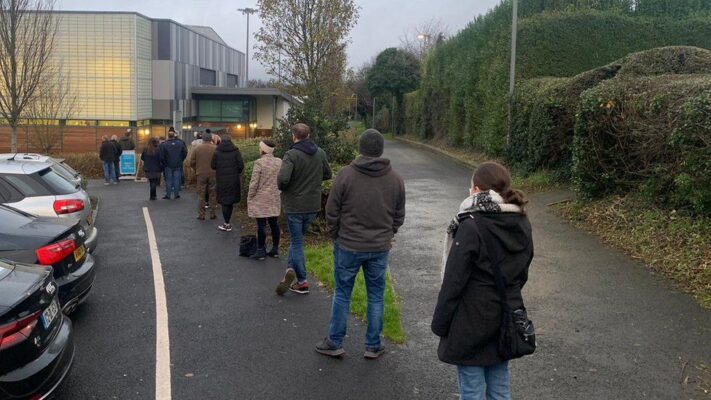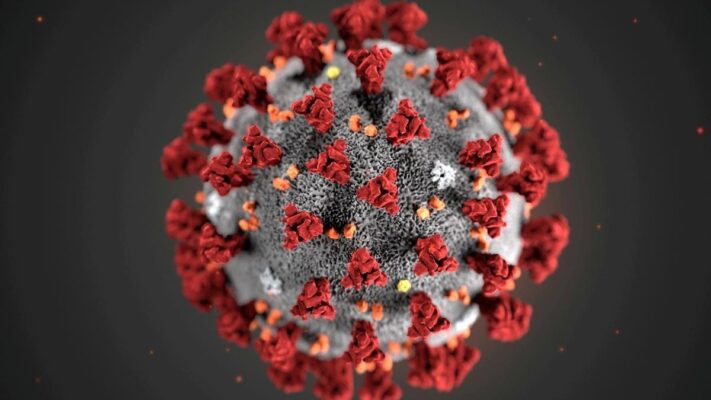
More than 600 people booked an appointment for the first day of booster vaccinations at the Foyle Arena
The Public Health Agency (PHA) said it was a “significant increase” in part due to rising community spread.
It also attributed the increase to a change in how cases were classified, meaning those recorded as “highly probable” are now automatically deemed to be confirmed cases.
The definition has been applied retrospectively to December 1.
Chief medical officer Sir Michael McBride said he was “more concerned at this stage than he has been at any stage in the pandemic”.
In a press briefing, Sir Michael asked the public to get vaccinated and to get their booster if they were eligible.
There was also a warning that re-introducing restrictions might be necessary to cope with rising figures.
Sir Michael said that it was “reasonable given the current growth that significant measures might be required”.
Chief scientific officer Prof Ian Young said he was confident “that we will respond rapidly and the public should be reassured there are contingency plans which can be activated very quickly by the executive”.
Dr Tom Black, chairman of the British Medical Association (BMA) in Northern Ireland, warned those who socialise next week will get Covid-19.
He said the Omicron variant was so infectious, the stark warning was a ”confident prediction”.
”You go out and mix with a crowd next week, one of them will have Omicron,” said Dr Black.
”It’s so infectious, you’ll then come home with it. Which is why I won’t be going out socialising this week or next.”
Dr Black called for people in the North of Ireland to get a booster vaccination.
He said: ”The booster is the only thing that’s going to protect you and your life, your family and your community.”
Dr Brid Farrell, PHA deputy director of public health, said the identification of more cases was not unexpected.
“But it does act as a timely reminder that each of us needs to do what we can to slow its further spread and help protect ourselves and those around us,” Dr Farrell said.
Sir Michael urged all adults to get a Covid-19 booster jab.
Boosters are now being made available at walk-in centres for those aged 30 and above, whose last dose was administered at least three months ago.
On Wednesday, the UK reported a record number of daily Covid-19 cases since the beginning of the pandemic, with 78,610 new cases.
In the North Ireland, four more Covid-related deaths were reported, with 2,156 new cases.
The North of Ireland is about two weeks behind what is happening in Scotland and England.
 Health officials said that they were monitoring the picture elsewhere to learn and prepare for what lies ahead locally.
Health officials said that they were monitoring the picture elsewhere to learn and prepare for what lies ahead locally.
While case numbers are rising, what is still not known is how these cases are reflected in hospital admissions.
A series of vaccine clinics opened across Northern Ireland in November to help meet demand for booster doses.
It was announced on Sunday that boosters would be available at walk-in centres for those aged 30 and above, whose last dose was administered at least three months ago.
Vaccination centres and pop-up clinics across Northern Ireland have now been experiencing large queues of people waiting for their booster jabs, with the Belfast Trust on Tuesday reporting “high demand”.
Stewards at the Foyle Arena in Londonderry, which reopened as a vaccination centre on Wednesday, said they were extremely busy earlier in the day.
The arena had previously been used to supply first and second doses of the Covid-19 vaccine, but is now being used for the booster programme.
By late afternoon on Wednesday, 760 boosters had been administered.
A vaccination centre at Templemore Sports Complex was providing booster jabs in the city but has since closed as Foyle Arean is a bigger venue.
Tags:




